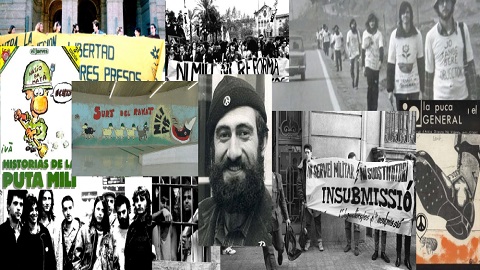Pepe Beunza, 50 years since the beginning of the insubmission to military service

The Humanities Library presents the exhibition "Pepe Beunza, 50 years since the beginning of the insubmission to military service" in the showcases on floor 0
21/09/2021
In 1971, a young man known as Pepe Beunza showed up at the barracks where he had to report for compulsory military service. He went and refused to do it, declaring himself a conscientious objector. He was the first young man to do so.
Conscientious objection was not recognized and could have little possibility of consideration in the context of the Franco dictatorship. However, Beunza's action was not an unconscious action, but quite the opposite. His objection was prepared and received the support of the non-violent groups that had been established in Spanish territory, as well as groups of objectors from other European countries and international pacifist and antimilitarist coordinators such as War Resisters International and the International Fellowship of Reconciliation. Beunza prepared himself physically and mentally to go to jail. Once imprisoned, the various support groups, both inside and outside of Spain, activated the prepared protest actions. The objective was to give a political dimension to the action, denouncing the lack of rights and inequalities caused by the Franco dictatorship.
Beunza's action was essential to open the way, he was the pioneer in openly refusing to pay, what was once called "blood tax". After him, other conscientious objectors came, in a few years the objection became collective in many parts of the Spanish territory and in 1977 the MOC (Movement of Conscientious Objection) was founded. The question of objection, although it is not one of the most important issues of the political transition, ended up on the agenda of those years, without reaching a definitive solution, projecting the problem into the following decades.
Indeed, during the 1980s, resistance to military service not only continued to grow, but also diversified and linked with other protest elements, configuring an antimilitarist movement with a wide echo among Catalan and Spanish youth. Finally, at the end of the eighties, the campaign of insubmission to military service was launched. The members of the insubordination movement continued many of the strategies that Beunza did twenty years earlier. The insubordination raised a collective disobedience in the State, becoming one of the most remarkable social movements of the last decade of the 20th century. His main political success was to force the end of compulsory military service.
The antimilitarist movement and the insubordination campaign continue to be a benchmark of victory in the imagination of many social movements. It all started with Pepe Beunza.
You can see the bibliographic exhibition in the cabinets on floor 0 of the Humanities Library. For more information check the website: https://mirades.uab.cat/exposicions/biblioteques/pepebeunza
You can not miss it, we wait for you!
This information is related to the following SDG
Peace, justice and strong institutions